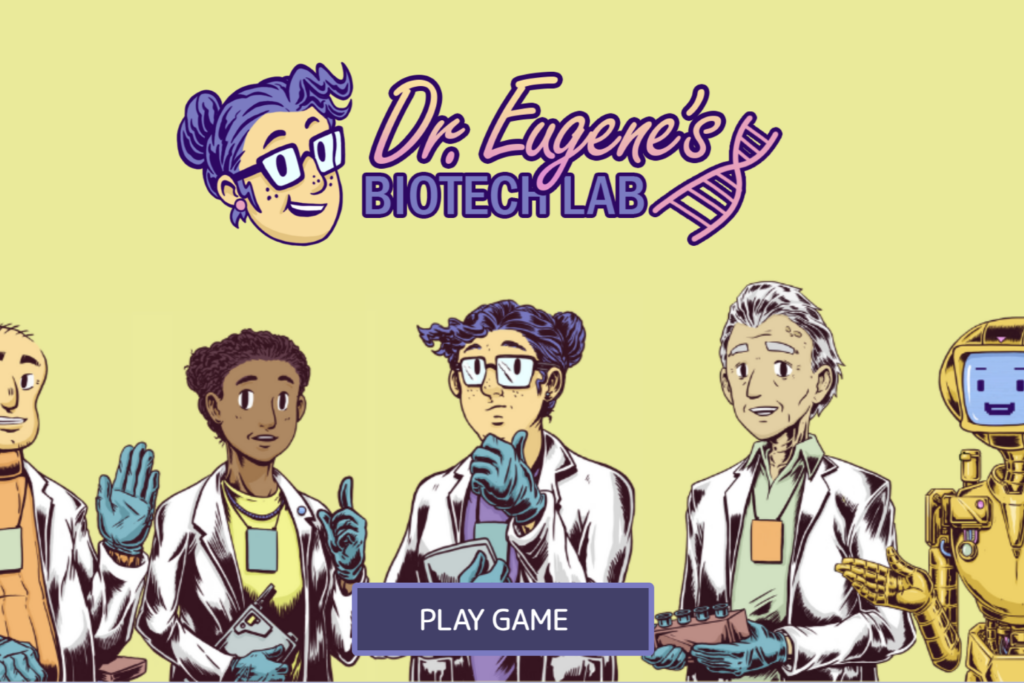Today is your first day working as a new intern at Dr. Eugene’s Biotech Lab, a new online game from the University of Connecticut Extension. Xeb the robot greets you and introduces you to the lab and the four gene editing research areas: food production, health, nutrition, and environment. You can explore each of these areas and work with different scientists to tackle problems facing this fantasy world. Each problem has an analogy on Earth.
UConn Extension, housed within UConn’s College of Agriculture, Health and Natural Resources (CAHNR), developed the game in partnership with the Learning Games Institute at New Mexico State University (NMSU). Jen Cushman, associate extension educator and UConn 4-H state program leader, is the principal investigator on this USDA-NIFA-funded project.
“This grant will provide young people with life-changing experiences through 4-H experiential learning in food and agricultural sciences, leading to STEM career development in biotechnology,” Cushman said. “Through their participation in this UConn 4-H program and participation in the game, we hope that young people will increase their awareness of STEM biotechnology careers and consider pursuing a biotechnology career in the future.”
The Department of Labor reports that 2.1 million life sciences jobs, which include biotechnology, food and agriculture, will be created at a 4.1% growth rate in 2023. It is a growing career field, and there is a recognized need for more qualified employees.
UConn 4-H is a program administered by UConn Extension that works with youth in multiple program areas across the state to foster the vibrancy, belonging, relatedness and engagement that are the foundations of 4-H.
UConn 4-H develops talent throughout all of its programs with leadership, healthy living, civic engagement, life skills and STEM as core areas. Each year, more than 21,000 youth participate in UConn 4-H programs across the state.
Promoting 4-H Youth Careers in Food and Agriculture through Biotechnology and STEM (Science, Technology, Engineering and Mathematics) takes a multifaceted approach to positive youth development.
First, youth will be placed in a group led by a UConn Extension instructor who will guide them through the biotechnology and education curriculum, foster a sense of belonging, and lead regular club meetings.
Next, the youth will participate in field trips to CAHNR and other locations. Finally, the youth will also participate in game development, pitching ideas to the UConn and NMSU teams and providing feedback during the game’s development.
“The early stages of developing the game were really exciting. We had a lot of ideas coming together,” said Kouthar Wehelie of Suffield, a UConn 4-H member who was involved in the process. “Just the thought of being able to teach all of this to young people really motivated us to find something to keep the kids interested. Learning about things like biotechnology was a really exciting process.”
The young people also created the title of the game through an interactive brainstorming and voting session.
Dr. Eugene’s Biotech Lab is the first of two games the team is producing, with the second scheduled for release in 2025. The program is currently recruiting youth to participate in its second cohort. NMSU Extension’s Learning Games Lab is an award-winning program that develops educational media for youth and adults.
This is the first time NMSU has involved young people in the game design process.
“It’s an educational game, it’s definitely one of the best. Learn about genetic modification and see if it’s fun. It’s a good starting point for sixth and seventh graders,” said John Anthony Samuel, a UConn 4-H member from Bloomfield, who was involved in the development and feedback process.
As players progress through the game, they will earn achievements in different laboratories. The game guides them through the entire scientific process, from gene editing mini-games to reviewing experimental results, filing patents and writing peer-reviewed publications.
Laboratory experiments include biotechnology successes and failures, providing a realistic overview of working in a science laboratory.
“I’ve always been interested in science,” says Samuel, “and Dr. Eugene’s biotechnology lab is a great way to introduce science to kids who may have been shunned at school or who don’t have a science background at home, and get them interested in science. It really makes you think deeper.”
This work relates to CAHNR’s strategic vision area, which focuses on a vibrant and sustainable agriculture industry and securing our food supply.
This research is supported by the Food and Agriculture Informal Education Program of the U.S. Department of Agriculture’s National Institute of Food and Agriculture (grant number 2022-68018-36094).

